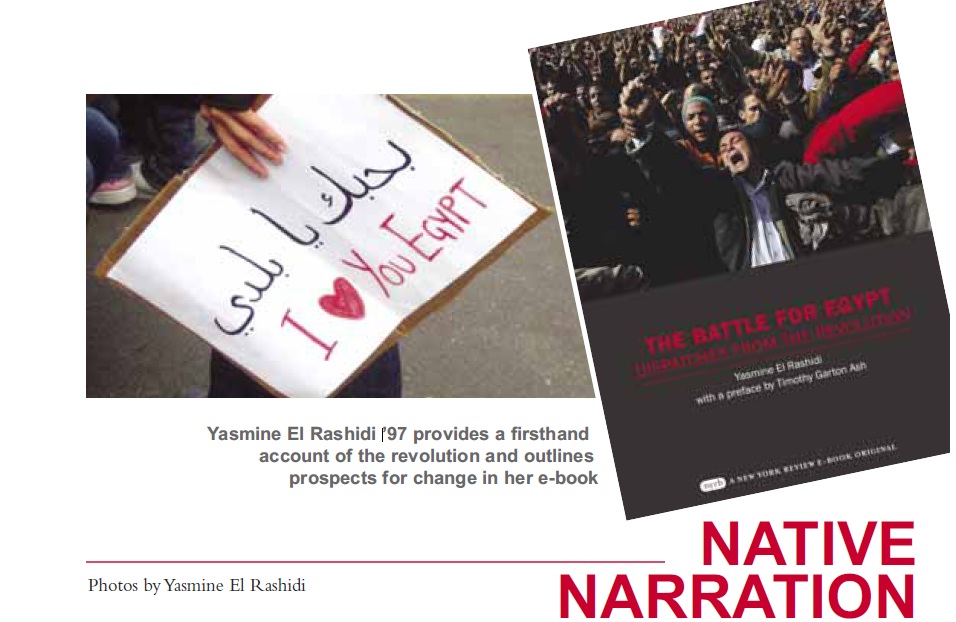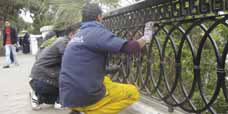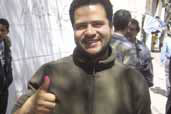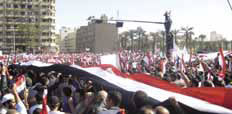
Yasmine El Rashidi '97 is a frequent contributor to The New York Review of Books (NYRB), as well as TIME, Aperture
and Bidoun magazines. She has written for numerous publications including
Al Ahram Weekly, The Washington Post and The Chronicle of Higher Education,
and has served for several years as a
staff writer and Middle East
correspondent for The Wall Street
Journal. El Rashidi graduated from
AUC with a bachelor's in journalism
and mass communication, and
attended postgraduate school at
Columbia University's Graduate
School of Journalism. Her newly
released e-book, The Battle for Egypt:
Dispatches from the Revolution (The New
York Review of Books, 2011), chronicles the Egyptian revolution through the
eyes of El Rashidi as a journalist,
writer and Egyptian citizen.
How was it different writing about the revolution? It was the most extraordinary, exhilarating experience of my life. It was also a great hallenge. In journalism school, we are taught to be objective, to keep ourselves out of the story, to maintain balance. In this case, it was particularly hard to do since the event was so intimate to me. I was trying to absorb it as a writer and journalist, but at the same time, I was experiencing it as an Egyptian who was also revolting. This was my revolution too, and my relationship with my country was transforming through it. The personal stakes were really high, so it was certainly different.
In my dispatches to the NYRB, the "I" is very much present. The pieces
were about my own experience, what
I was seeing, hearing, and what was
happening around me.
Did you feel that Egypt was on
the brink of change?
Absolutely. The minute I entered Tahrir
Square at 3 pm on January 25, it was
clear something exceptional was
happening. I had been in Shubra in a
marching protest since the morning,
but it was when I got to Tahrir that my
breath was really taken away. The square
was packed. I had never seen anything
like it before. Then on January 28,
I knew we had hit the tipping point.
That morning, I went to pray at the
Mustafa Mahmoud Mosque with two
friends. I admit I was quite scared. The
phones and Internet had been cut, and
there were state security police, trucks and informants everywhere. I wasn't
sure we would ever make it out of the
mosque. The second the prayer ended,
the chanting began: "Freedom,
Freedom, Freedom, Masr, Masr, Masr!" When we walked out, I was absolutely lost for words. The main street was
already packed with tens of thousands
of people, waving the Egyptian flag,
marching, chanting. I knew at that
point we had broken a barrier of
something. This was the critical mass.
And a few hours later, in a battle on
the bridge heading to Tahrir, you could
see fear being faced and overcome.
The young men at the front lines were
relentless, despite the endless tear gas
being used on us. They kept on
pushing forward. They were willing to
fight, to risk their lives. There was a
moment, crossing Al-Galaa Bridge,
when the riot police fled, and the
young men got up onto the state
security trucks and raised the Egyptian
flag. It was incredible. "On to Tahrir!" they shouted. That moment, I knew we
had already won in a way.
Was there a sense that this was
coming?
I think many of us felt something
beginning to shift before the revolution
started.
Last year was something of a
brutal one for the country, and by the
time the parliamentary elections came
round, which were a sham, it was clear
that something was about to snap. The
parliamentary elections annihilated the
opposition, creating for the
government its greatest ever cohort of
aggrieved politicians. The church
bombing enraged both Copts and
Muslims. The youth activists were
already angry because of Khaled Said
and a million other things, and at a
grass-roots level, people were struggling
to survive. Everyone had had enough,
and by early January, when Tunisia
went up in flames, it was clear we
wanted the same. We were itching to
revolt. You could feel it; it was palpable,
in the air of the city. Tension had been
mounting. The time was close.
Why did you write this book?
I had been writing dispatches for
NYRB, and the publisher, Rea S.
Hederman, decided that it would make
a good book –– as a document, or
testimony, of a time, place and moment
in history.
In your book, you speak about the
strengths and limits of the protest
movement. Describe those.
I think its strength was uniting people,
and, as a movement that was focused
for 18 days, the strength of that focus
was incredible –– it toppled a dictator.
Its limits, right now, are fragmentation,
and at times, an elitist view on some
issues. There are protests every other
day for something. It seems that the
second someone is not happy with
something, they go out and strike. That
is not constructive. We should use the
lesson from Tahrir to mobilize mass
sit-ins, but we need to really think
about what we are asking for. The
backbone of the protest movement
was about survival –– being able to
feed children and support families.
Let's remember what Tahrir, at its core,
was really about.
You also address the prospects for change in your book. What change
do you wish to see in Egypt?
I'd like to see less struggle in the
country. When you go out into the
informal settlements and beyond, it's
heartbreaking. Too large a portion of
the population really suffers, just dayto-day they can barely survive. That
I wish would change. This country is
not poor; we have incredible land
resources that could be developed. It
needs someone with vision, someone
with the interests of the poor in mind,
someone who doesn't think of business
or themselves. For the rest of us, I wish
there was a greater sense of freedom to
be who you want, who you are, who
you need to be. I think back to stories
my grandmother used to tell; it was a
different Egypt. Young women could
walk in the street with short skirts, and
it was okay. Now you are harassed even
if you're covered up. I guess things like
that are luxuries and maybe even at this
point trivialities, but they shouldn't be.
They should be basics. It's all about
liberty, dignity and respect.
How do you see the road ahead?
We have a long way to go; it's not
going to be a smooth transition.
I don't think that it's the end of
clashes, protests, economic woes or
sectarian tensions. In many ways,
I think it may get worse before it gets
better, but in other ways, it is already
better. There is something that
is slowly unfolding, which is
accountability. Within ourselves, there
is also a different sense of ownership,
engagement, connection and pride to
this landscape called home. Something
fundamental has shifted within the
Egyptian psyche. That's invaluable and
shouldn't be forgotten.
By Dalia Al Nimr

|
 |
 |